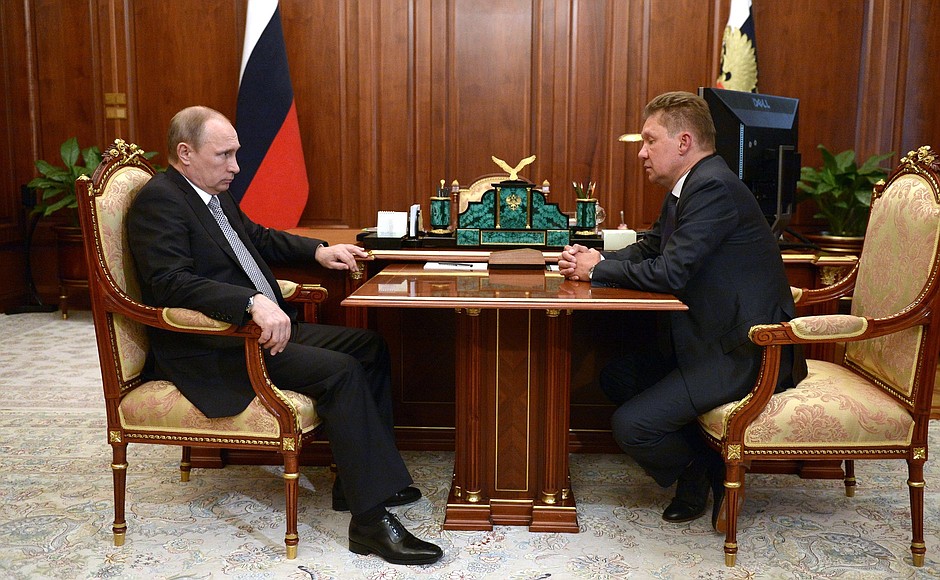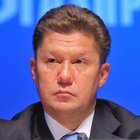
President of Russia Vladimir Putin: Mr Miller, the company has not yet summed up results for the first half-year, but you have the results for the first quarter and you can see the trends. My first question is about this.
My second question is about getting more towns connected to the gas supply network. This is our public’s priority concern. What is happening in general on the domestic market?
Of course, I would also like to hear about the situation on our traditional markets abroad, and I would like to hear a few words about what is happening with your big projects.
Gazprom CEO Alexei Miller: The situation on the gas market has considerably improved in 2015 compared to the end of 2014. We can see this from the volumes of gas we are supplying. There has been a small increase in consumption on the domestic market. As for exports, the trend here is very good. For example, Germany, which consumes a lot of Russian gas and is our number one market, bought more than 68 percent more gas in May 2015, compared to May 2014. This shows that demand for Russian gas is growing and there is no doubt that new contracts for long-term Russian gas supplies to the European market is on the current agenda for talks with our European partners.
Last year, Gazprom produced 444 billion cubic metres of gas. Our production capacity actually comes to 617 billion cubic metres, but the amount we are producing is sufficient to meet Russia’s needs over the autumn and winter period without problem, and satisfy any spikes in demand that could come in the event of abnormally cold weather.
Vladimir Putin: Are you able to increase production quickly?
Alexei Miller: Yes, we can increase our production rapidly and be sure of covering in full spikes in demand here at home and on our export markets. We can thus guarantee absolute reliability and no disruption of supplies.
Vladimir Putin: What is happening with your big projects?
Alexei Miller: As far as our big projects go, the most important project right now is the Power of Siberia project. We began the construction last year. Mr President, you launched the start of this gas pipeline’s construction. Work is proceeding strictly to timetable and there are absolutely no problems. Everything is going as normal.
The Chinese have approved the decision on construction on their side, and at the end of this month an official ceremony will take place to launch construction of the pipeline section on Chinese territory.
I was in China and met with First Vice Premier Zhang Gaoli. During our talks, we also touched on the matter of drafting a contract on the western route. You and the Chinese President witnessed the signing on May 8 of framework agreements on basic conditions for gas supplies to China and a contract on the western route. More than a dozen provisions have been fully settled in legal terms. They include the term of 30 years for gas supplies to China, annual contracted volumes of 30 billion cubic metres, construction deadlines, and a number of provisions on the quality specifications for the gas supplied. In other words, we have already laid the foundations for a future contract.
Comparing the negotiations timetable for the contract on the western route with the contract on the eastern route, it took us around 8–9 months to reach the actual signing. During our talks in China though, we agreed that we would speed up this work and have already given the talks new impetus. Furthermore, the experience already gained during our work on the eastern route will certainly come in useful now. After all, some of current contract’s provisions and terms can be used in the contract on western route too.
Vladimir Putin: What is happening with work to expand the gas network here at home?
Alexei Miller: We will maintain the 2014 level of network expansion and investment in the programme. This investment comes to more than 28 billion rubles. Last year, we laid more than 1,400 kilometres of gas pipelines between settlements and connected 236 settlements to the gas network. Since this programme began on your initiative in 2005, more than 3,510 settlements have been connected to the network and we have laid more than 25,000 kilometres of inter-settlement pipelines.
Now, the national average for connection to the gas supply network comes to 65.4 percent. The average for urban areas is 70.3 percent, and in rural areas it is 54.6 percent. You set the task of giving priority attention to connecting rural areas to the network, and there has been an increase of more than 20 percent in gas network connection in rural areas since the programme began in 2005.
We now have two thirds of the country overall connected to the gas supply network. Considering our size and the fact that we have some very remote settlements, this is a decent result. We realise of course that in some regions we should be able to ensure 100 percent connection to the network, in particular in central Russia. Some regions have already achieved this goal. Let me cite the example of Belgorod Region, and Tatarstan. In central Russia though, we do of course have the highest benchmark when it comes to having people connected, whether in urban or rural areas.
Part of our eastern gas development programme involves getting places in eastern Siberia and the Far East connected to the gas supply network too. This work is also proceeding as part of the Power of Siberia project, in the regions whose territory will be crossed by the new gas pipeline.
Vladimir Putin: Good.
<…>
